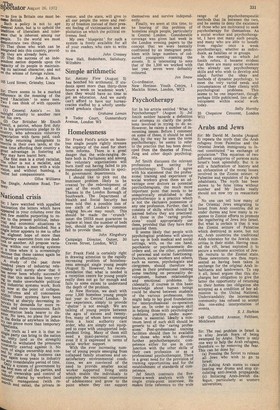Psychotherapy
Sir: In his article entitled ' What is Psychotherapy?' (August 3) Jef Smith neither hazards a definition nor attempts to clarify the problems involved in trying to do so. However, he raises a number of interesting issues. Before I comment on some of these, it should be said that, by the way he uses the term psychotherapy, he seems to refer to the practice that has been developed from the theories of Freud, Jung and other depth psychologists.
Jef Smith discusses the relevant professions and setting for psychotherapy. Though I agree with his statement that the professional training and experience of social workers gives them an advantage over doctors as potential psychotherapists, the much more important point that needs to be unequivocally established is that psychotherapy is a practice which is not the exclusive possession of any one profession. Further, that it consists of skills which should be learned before they are practised. All those in the caring professions ' could appropriately use them, provided that they have first acquired them. It seems likely that people with psychological problems will always turn up in bath medical and social settings, with, on the one hand, psychiatric or psychosomatic disorders and, on the other, problems of personal and social functioning. Doctors, social workers and others, such as nurses, psychologists and clergymen, should therefore be given in their professional training some teaching on personality development, human relationships and emotional problems. Incidentally, if courses in •this basic knowledge about human beings could be shared between students of the various professions, this might help to lay good foundations for interprofessional co-operation later on. In order to acquire skill in helping those with psychological problems, practice under supervision is essential. Ideally a minimum level of such skill should be generic to all the 'caring professions.' Post-professional training facilities should then be available for those who wish to develop further psychotherapeutic competence either for use in conjunction with the other skills of their own profession or as a professional psychotherapist. There is a great need for the provision of training opportunities and for the establishment of standards of competence. Jef Smith contrasts the fivetimes-a-week analysis with the single crisis-point interview. He makes little reference to the wide range of psychotherapeutic methods that lie between the two, and he seems to deny the existence of those who are motivated to seek psychotherapy for themselves. As a social worker and psychotherapist, I have met many such people, and many who are able to benefit from regular once a week psychotherapy, whether as individuals, as families or in groups.
In the meeting to which Jef Smith refers, it became evident that there are many social workers who already use psychotherapy skills and who wish to develop and adapt further the ideas and methods of dynamic psychology, to meet the very varied needs and circumstances of their clients with
psychological problems. This seems to be one important, though perhaps little publicised, line of development within social work today. Sally Hornby
35 Chepstow Crescent, London W11










































 Previous page
Previous page